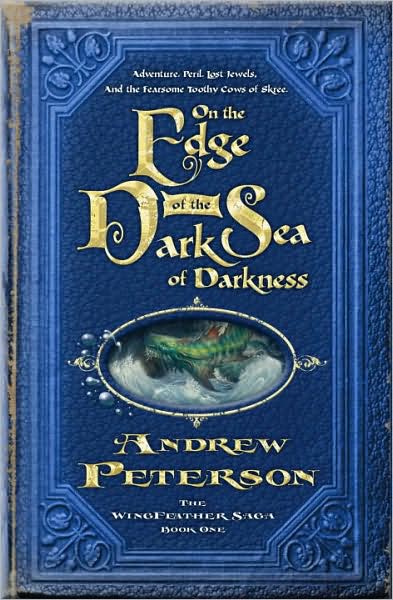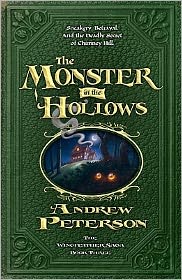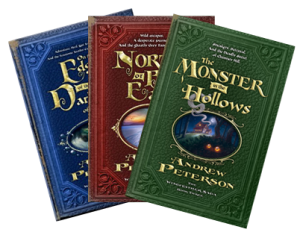An Unfolding Saga
It must have been three or four years ago when I first stumbled across a book called On the Edge of the Dark Sea of Darkness. I felt a distinct indifference, and I moved on.
Some time later I entered a book drawing with about twenty different Christian fiction titles. Out of these, I won North! Or Be Eaten. I knew nothing about the book, but it was Christian fantasy and I was determined to try it. I examined it for any sign that it was part of a series (most books are, it seems) and discovered that it was the second book of the Wingfeather Saga.
The first was, of course, On the Edge of the Dark Sea of Darkness. Thus began my journey into the Wingfeather Saga, written by Andrew Peterson. And now, with the publication of The Warden and the Wolf King, it’s over.
The Wingfeather Saga underwent quite an evolution from its first book to its last, and my purpose here is to examine that change over the course of four books. We begin, as Andrew Peterson did, with …
 On the Edge of the Dark Sea of Darkness
On the Edge of the Dark Sea of Darkness
The book – the whole saga, for that matter – opens with the legend of how, on the first morning of the world, the first man said to the first thing he saw (a rock): “Well, here we are.” This first sentence “was taught to children and their children’s children and their children’s parents’ cousins and so on until, quite by accident, all speaking creatures referred to the world around them as Aerwiar.”
The most immediately striking characteristic of this novel is its profusion of humor, especially of an absurd flavor. Aerwiar itself is a world of pandemic quirkiness. It is displayed in everything from store front signs – “THE ONLY INN: Glipwood’s Only Inn” reads one – to the most ancient legends. Andrew Peterson completes the effect by sprinkling the book with deadly-earnest footnotes that somehow always end up adventures in zaniness. “For ages,” goes one, “the Torr Dynasty nursed a disturbing fondness of all things kitten …”
But the comically bad writing (“a nameless evil, an evil whose name was …”) gives way to skillful story-telling, and the absurdity coexists with danger and adventures and sadness. The plot is solid, though not spectacular. In the end, three things make this book stand out: the humor, the quirky and unforgettable world of Aerwiar, and the characters. The characters go straight to your heart.
Into the possibilities opened up by On the Edge of the Dark Sea of Darkness marched …
North! Or Be Eaten
 On the Edge of the Dark Sea of Darkness was a good book, but it wasn’t until North! Or Be Eaten that the Wingfeather Saga achieved excellence. This second book proved a great expansion of the story.
On the Edge of the Dark Sea of Darkness was a good book, but it wasn’t until North! Or Be Eaten that the Wingfeather Saga achieved excellence. This second book proved a great expansion of the story.
Part of it was a matter of simple geography. On the Edge takes place entirely within the Glipwood Township and its immediate environs. North! leaves Glipwood behind, traversing the mighty, perilous falls, the lawless Strand, and on into Dugtown, Kimeria, the Ice Prairies, the Fork Factory, the burrows.
The characters, too, are broadened. Janner and Tink, tried and tested, begin to discover what’s in their own hearts. Podo, always colorful, gains texture; we begin to understand Artham. (Poor, poor Artham.)
In a portent of things to come, the Fangs progress beyond goblin figures to something much more tragic. So Peterson pulls back the curtain on one of the most significant elements of his story. It will become the fulcrum of the Wingfeather Saga.
Although the humor is still plentiful, the tone grows more serious as the characters’ journeys grow darker. But if the pain is greater, so is the triumph. In the glorious transformation scene near the book’s end, the saga reaches a magnificence over and above anything it had achieved before.
The shift begun in North! was not drastic, but it would continue in …
Monster in the Hollows
This is the mo st staid book of the Wingfeather Saga. It’s not as funny as the first book, not as intense as the last, not as exciting or as variable as the second. The middle hundred pages read like a school story.
st staid book of the Wingfeather Saga. It’s not as funny as the first book, not as intense as the last, not as exciting or as variable as the second. The middle hundred pages read like a school story.
And yet it is a serious book – in its own way, the most serious of the first three books of the saga. It takes a clear view of the Fall of Man, not in its villains but in its heroes. There’s an echo of Aleksandr Solzhenistyn’s lament: “A human being is weak, weak.” Another major theme of the novel is shame, both deserved and undeserved.
The end of the book is a masterpiece, woven with glory and tragedy, and while it is the least adventurous chapter of the saga, Monster in the Hollows is a beautiful, weighty work. And the pace will change again in …
The Warden and the Wolf King
After the relative quietness of the third book, the fourth ups the tempo beyond anything yet seen. This last book is easily the most intense: the greatest danger, the most action, the most sadness, the least lightheartedness. There are glimmers of humor, but nothing like the earlier books. Even Monster in the Hollows was funnier.
the most intense: the greatest danger, the most action, the most sadness, the least lightheartedness. There are glimmers of humor, but nothing like the earlier books. Even Monster in the Hollows was funnier.
The joke on the first page of the first book, about the Nameless One whose name was Gnag, is resurrected into something earnest, the tragedy at the root of the Wingfeather Saga. It unites with the story’s most consistent theme: What is your name? In the end, it’s not without a hope of redemption.
In the meantime, there’s a lot of struggling. The Warden and the Wolf King is sadder than its predecessors, even as it brings final victory and a measure of redemption. A phrase appears multiple times in the story – the Maker’s good pleasure, even in things we would not call happy.
The book is long, 520 pages, and it spends that length bringing the saga’s ideas to full fruition and resolving its various storylines. (The only unfinished storyline is Artham’s. Again: poor Artham.) The difference in tone from On the Edge of the Dark Sea of Darkness to The Warden and the Wolf King is striking, but it’s the same story, the same characters, the same world.
I was unimpressed, those years ago, by the title of a book. When I actually read it, I discovered it was a good book. And when I joined the unfolding saga, I discovered it was also the beginning of one of the best fantasy series I have ever read.





























Interesting. My tastes have always run more to the intense than the humorous. But if this series transforms as much as you say, I may have to check it out.
I like absurd humor, so I enjoyed the series from the start. As it grew more intense, I liked that, too.
I don’t know if the author will write another novel, but if he does, I’m hoping for something a little lighter. More fun, less war and death.
I still haven’t read the fourth book, but I thought the others were unique.
Shannon, what a great rundown of all four books. Excellent! I hope Andrew Peterson sees this. It’s such a great explanation of the series. Would be good promotional material!
I really think this is the closest thing to a contemporary CS Lewis, but it’s sort of a Lewis/Tolkien hybrid. I mean in the quality. The story is completely unique. OH, and though I haven’t finished The Warden and the Wolf King (poor Artham? Oh, no!), I see a brilliant opportunity for redemption. I’m hoping I’m right.
Becky
It would be fun if he did see this.
I’m looking forward to the blog tour, to see what you and everyone else thinks of The Warden and the Wolf King. It was quite a book, and there was a lot I didn’t see coming in the ending.
And yes: Poor Artham. That’s just how these books run. Also, poor … but I won’t say. That might help you see it coming.
If I had more ready money, I would be throwing it at the screen. This sounds interesting if only to see how well-rounded the author is with such a wide range of tone and genre-dabbling.